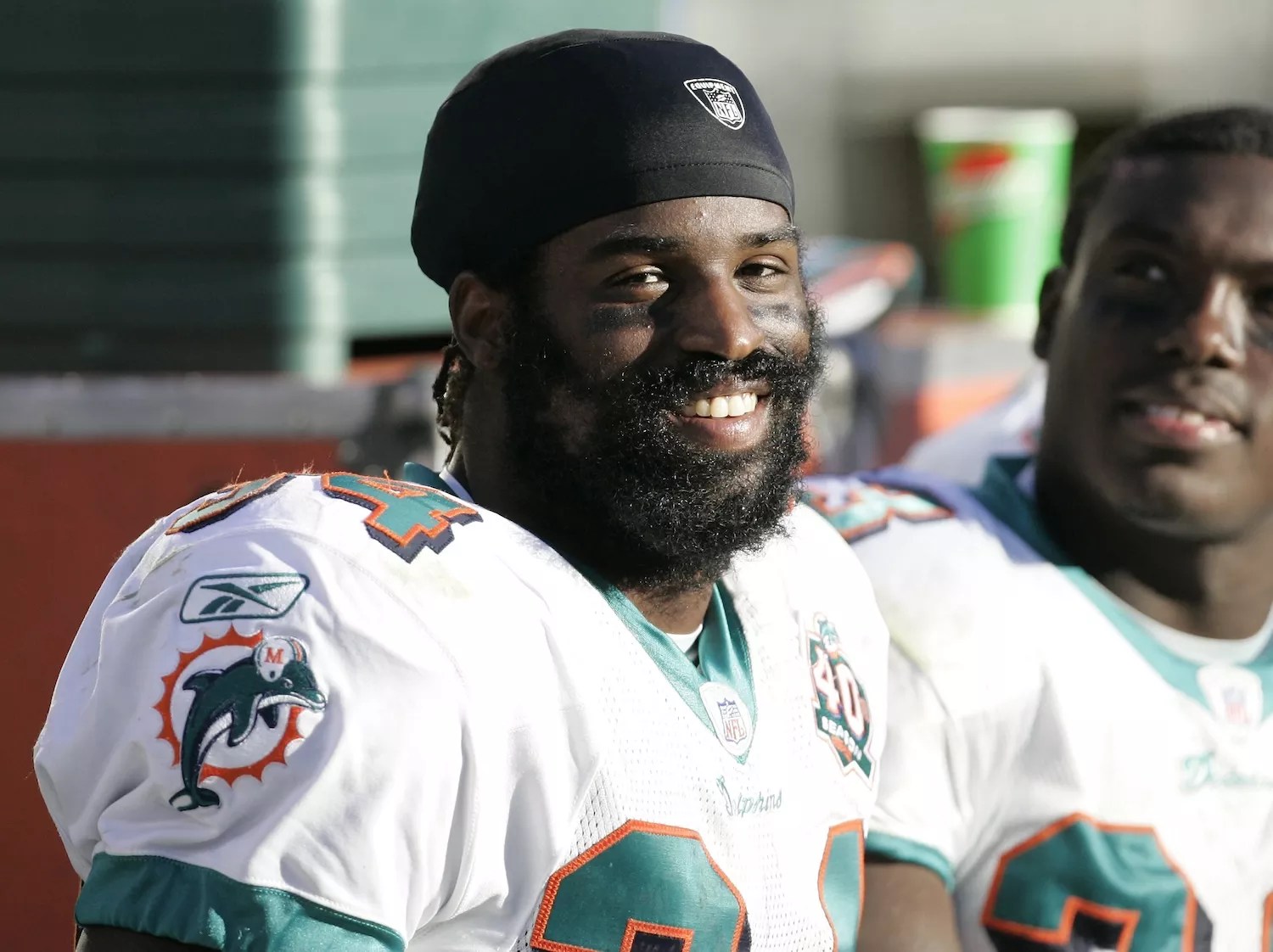
Photo by Robert B. Stanton/Getty Images

Audio By Carbonatix
The NFL needs to “Run Ricky Run” to give Ricky Williams an apology. And, while they’re at it, a gold jacket.
The NFL’s recent decision to invest in cannabis research and the NCAA’s removal of cannabis from its banned substances list has renewed attention on former Miami Dolphins running back Ricky Williams, whose career was significantly affected by the NFL’s previous anti-cannabis stance.
Let’s be real – affected is an understatement. The NFL’s archaic, iron-fisted drug-testing policies cost Williams the prime of his NFL career.
In 2021, the league revised its testing policy. Players are now tested at the start of training camp and punishments are far less severe than in years past. But this latest, more profound interest in cannabis has triggered Dolphins fans who were robbed of the best years of Williams’s career and, at multiple junctures, gaslit into despising him.
Most Dolphins fans don’t need to be reminded that Williams was suspended five times over the course of his career for violating the league’s substance-abuse policy – each time owing to his use of cannabis. These suspensions caused him to miss two full seasons during his prime, including a yearlong suspension in 2006 that completely derailed an entire era of Dolphins football, a debacle from which they have yet to recover fully.
For those of you who were lucky enough not to live through the drama, here’s a little history lesson that’s hard to believe happened 20 years ago, considering how much has changed in the way society now looks at cannabis use.
Ricky initially retired in 2004 on the eve of training camp after multiple suspensions, only to return in 2005 before being suspended again for the entire 2006 season. His return to the Dolphins in 2007 – at the time one of the most hyped moments in franchise history – lasted all of one carry before he suffered a torn chest muscle that cost him the rest of the season. Ricky returned in 2008 and had some Pro Bowl-caliber moments, including the famed Wildcat success, before retiring in 2011 following a short stint with the Baltimore Ravens.
Despite the interruptions, Williams managed to gain more than 10,000 rushing yards and score 74 total touchdowns during his career. But it’s hard to imagine what his stat line would have looked like if he hadn’t been constantly harassed by the suspensions, which, in hindsight, are a tragedy.
Knowing what it knows now, it’s clear the NFL owes Ricky Williams an apology. The best way to do so would be to enshrine him in the NFL Hall of Fame – an honor he undoubtedly would have received if not for the unwarranted suspensions and the drama they caused.
Don’t take our word for it, though. Former Detroit Lions star Calvin Johnson is a much better source on the subject.
“Ricky would probably be a first-ballot Hall of Famer if he didn’t have the issues with that,” Johnson told TMZ Sports late last year.
To Williams’ credit, since his retirement, he’s spent much more time advocating for players’ use of cannabis than he has rehashing his past. His main argument is that for far too long, the NFL’s culture has normalized pill popping – often involving substances that would be illegal to obtain on the streets without a prescription.
“I think the next step, though, is at the end of a game, if we’re on the plane ride home, the trainer is walking down the aisle and has two capsule cases – one of Ambien, and the other one of Vicodin,” Williams told TMZ Sports in a 2023 interview. “And he’s walking down the aisle and saying, ‘Do you need any of this, do you need any of this?'”
Williams has long made clear that the demonization of cannabis makes little sense, as it has far fewer side effects than many of the options players are encouraged to indulge in.
“And the truth is, for football players, we do need something because it hurts, and you’re all revved up and it’s hard to calm down and go to sleep. And I’d love to see cannabis as being one of those things that the trainer is walking down the aisle and offering to those players.”
Ricky has been much more than all talk on the subject of cannabis culture.
Since his retirement, he has become a prominent advocate for cannabis, pushing for its acceptance as a legitimate form of pain management and treatment for NFL players. Williams has founded “Highsman,” a cannabis lifestyle brand, and continues to promote cannabis use as a means to enhance athlete wellness and recovery.
Williams has spent much of his post-career days arguing that the NFL’s policy shifts do not go far enough and that the league should proactively support cannabis as a tool for treating player ailments rather than merely allowing its use. To his credit, he rarely, if ever, mentions how those same policies sidetracked his career to the point that he was living in a tent, feeling ostracized by the game that both hurt and helped his mental state during a tough time in his life.
Sometimes, you live and learn. And sometimes it comes time to make good on your wrongs.
Ricky Willams deserves an apology from the NFL. And he most definitely belongs in the NFL Hall of Fame.